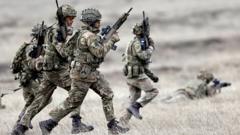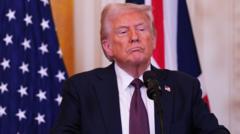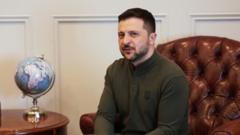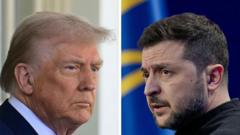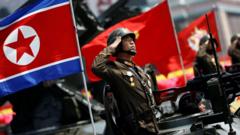In the wake of the Trump administration's overtly adversarial stance, European leaders are grappling with how to navigate an increasingly turbulent international arena.
Europe's Leaders Confront a Shifting Reality: Trump's New World Order

Europe's Leaders Confront a Shifting Reality: Trump's New World Order
Europe's response to Trump's isolationist policy shifts the geopolitical landscape, prompting military readiness discussions and potential troop deployments.
February 18, 2025
For years, European powers have sought to mitigate their reliance on an unpredictable United States, but recent actions by the Trump administration have catalyzed a strategic pivot. During an emergency summit in Paris on Monday, leaders from major European nations, including Germany, Britain, and France, found themselves confronting a disconcerting reality: a U.S. ally behaving increasingly like a rival.
President Trump's proposal for a peace settlement in Ukraine—negotiated unilaterally with President Vladimir Putin and without the involvement of Ukrainian or European officials—has left European leaders scrambling. Facing significant geopolitical pressure, nations such as Germany and France are weighing the potential deployment of thousands of troops to Ukraine as part of a new peacekeeping initiative, a move that underscores the shift towards sovereign decision-making free from American interference.
Military budgets among European nations are already under scrutiny, with calls for substantial increases that echo defense spending rates not witnessed since the Cold War. “The current moment is understandably anxious,” noted Lawrence Freedman, a prominent war studies professor. “It’s evident that Europe will need to elevate its defense posture.”
However, this shift carries significant domestic ramifications. While there remains a strong commitment to supporting Ukraine amongst the populace, the prospect of sending troops into an active conflict zone poses a delicate political dilemma for many European leaders. Troop commitment could quickly turn into a contentious issue within their own borders, where fiscal constraints could complicate military planning further.
French President Emmanuel Macron, initially a proponent of a peacekeeping deployment, finds his political capital diminished following a recent parliamentary election setback that has left his administration precariously positioned.
With Trump’s new approach to foreign policy forcing an identity reassessment, Europe’s leaders are on the brink of a pivotal response that could redefine the continent's military and political future in the face of an uncertain alliance with the United States.
For years, European powers have sought to mitigate their reliance on an unpredictable United States, but recent actions by the Trump administration have catalyzed a strategic pivot. During an emergency summit in Paris on Monday, leaders from major European nations, including Germany, Britain, and France, found themselves confronting a disconcerting reality: a U.S. ally behaving increasingly like a rival.
President Trump's proposal for a peace settlement in Ukraine—negotiated unilaterally with President Vladimir Putin and without the involvement of Ukrainian or European officials—has left European leaders scrambling. Facing significant geopolitical pressure, nations such as Germany and France are weighing the potential deployment of thousands of troops to Ukraine as part of a new peacekeeping initiative, a move that underscores the shift towards sovereign decision-making free from American interference.
Military budgets among European nations are already under scrutiny, with calls for substantial increases that echo defense spending rates not witnessed since the Cold War. “The current moment is understandably anxious,” noted Lawrence Freedman, a prominent war studies professor. “It’s evident that Europe will need to elevate its defense posture.”
However, this shift carries significant domestic ramifications. While there remains a strong commitment to supporting Ukraine amongst the populace, the prospect of sending troops into an active conflict zone poses a delicate political dilemma for many European leaders. Troop commitment could quickly turn into a contentious issue within their own borders, where fiscal constraints could complicate military planning further.
French President Emmanuel Macron, initially a proponent of a peacekeeping deployment, finds his political capital diminished following a recent parliamentary election setback that has left his administration precariously positioned.
With Trump’s new approach to foreign policy forcing an identity reassessment, Europe’s leaders are on the brink of a pivotal response that could redefine the continent's military and political future in the face of an uncertain alliance with the United States.

